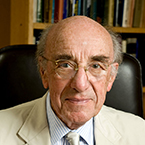
Long considered one of the founders of the field of neuroendocrinology, Dr. Guillemin was awarded the 1977 Nobel Prize for co-discoveries that led to an understanding of hypothalamic hormone production in the brain. His group isolated thyrotropin-releasing hormone, gonadotropin-releasing hormone, somatostatin, and somatocrinin. Synthetic analogs of these brain hormones developed in his laboratory have since been used to treat several types of tumors and a wide range of diseases and conditions.
Dr. Guillemin was also the first to isolate a group of neuropeptides called endorphins, which have a variety of roles, including in the perception of pain. His most recent research addressed fibroblast growth factors, inhibins and activins. In his early years, his medical studies in his native France were interrupted by World War II, during which he joined the French Resistance and helped refugees escape to Switzerland. In his later years, he has turned to creating abstract impressionist art, which has been prominently displayed in major galleries.
Career Highlights
2007-2009 Interim President, The Salk Institute
1980 Elected to the French Academy of Sciences
1977 Nobel Prize in Medicine or Physiology
1976 National Medal of Science
1976 Passano Award in the Medical Sciences
1976 Dickson Prize in Medicine, University of Pittsburgh
1976 Elected Fellow, American Academy of Arts and Sciences
1975 Albert Lasker Basic Medical Research Award
1974 Elected Member, National Academy of Sciences, Washington, DC
1974 Gairdner International Award
1973 Legion d’Honneur
1970-1989 Professor of Neuroendocrinology, The Salk Institute for Biological Studies
1953-1970 Professor of Physiology, Baylor College of Medicine
1953 PhD, University of Montreal
1949 MD, University of Lyon